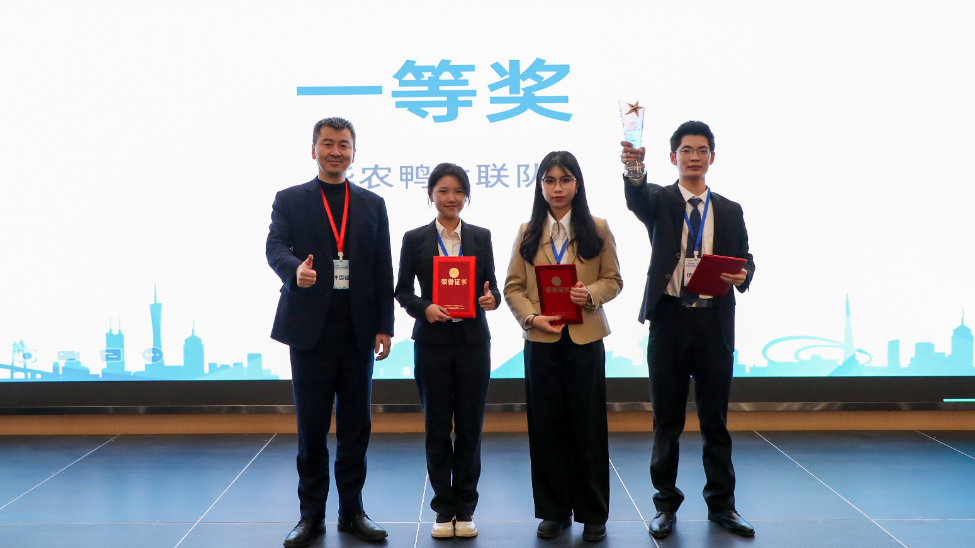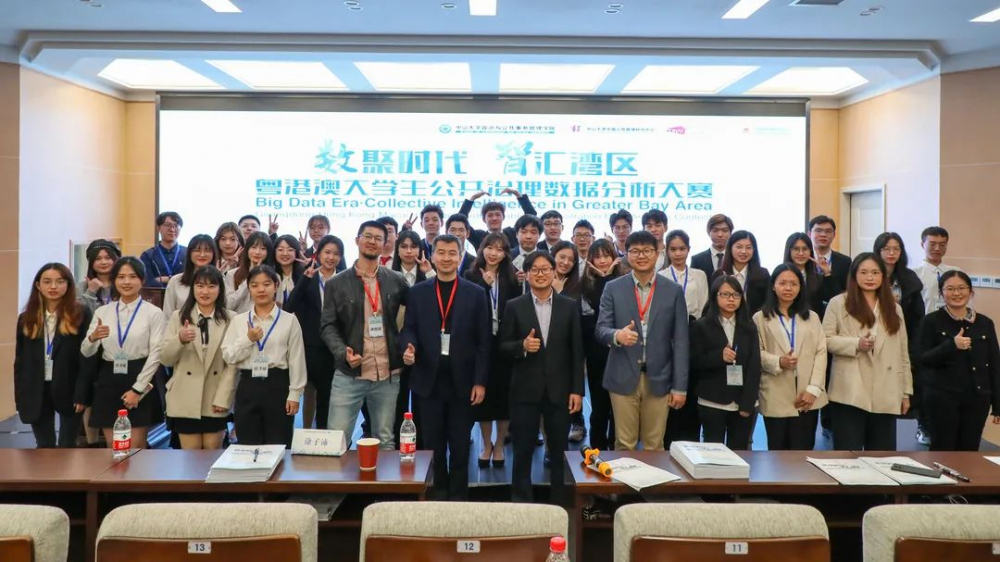Under the theme “Talent-led and Data-Driven Greater Bay Area”, the first Guangdong-Hong Kong-Macau Students Competition in Public Governance Data Analysis has been successfully concluded
On the afternoon of January 8th, 2022, the first Guangdong-Hong Kong-Macau Students Competition in Public Governance Data Analysis was held both online and offline in Room D215, the building of the School of Government, on the East Campus of Sun Yat-sen University. The event was co-sponsored by the School of Government and the Center for Chinese Public Administration Research of Sun Yat-sen University, the Department of Public Policy of the City University of Hong Kong, and the Center for Data and Science of the University of Macau. Thirteen teams were prepared for the competition and showed their passion and vigor.
Many guests were invited to attend the competition and served as judges, including Mr. Liang Zhanpeng, senior systems manager from the Office of the Government Chief Information Officer of the Hong Kong SAR Government, Prof. He Daji, Head of the Department of Public Policy of City University of Hong Kong, Dr. Liu Ning, Assistant Professor of Department of Public Policy, City University of Hong Kong, Mr. Chen Zurong, head of Technology Application and Support Division, Economic and Technological Development Bureau, Macau SAR Government, Mr. Yu Lianghao, acting director of the Center for Data and Science of the University of Macau, and Associate Professor Cai Tianji, Department of Social Sciences, University of Macau, and Mr. Tu Zipei, an expert in big data technology, Professor Liu Hongbo, the School of Public Administration, South China University of Technology, and Professor Zhang Shuwei, the School of Government, Sun Yat-sen University.
Speech of Guests
Before the competition, Liang Zhanpeng and Chen Zurong were invited to deliver a speech. They both expressed their appreciation for the effectiveness and innovation of the teams who apply data technology in addressing social governance issues. Mr. Liang said, "Guangdong, Hong Kong, and Macau have borders, but data analysis has no borders". And he looked forward to additional exchanges and cooperation with young people from Guangdong, Hong Kong, and Macau in applied data analysis in the future. He also hoped that meaningful competition can be held in the future to show additional possibilities of data application. Furthermore, according to Mr. Chen, society has created more diverse demands on public governance in the digital era, so he expected that the public sector will respond to the challenges and enhance the efficiency of social operation with big data analysis and other innovative technologies.
Wonderful Performance and Oral Defense of the Teams
Following the trend of the digital era, this competition led the participants to further strengthen the industry-university-research cooperation and encouraged students to focus on the effective combination of digital and data technology and public governance, as a way to stimulate innovation and creativity. In the final competition, the topics of thirteen teams included various trending issues, such as shared bicycles, telecom fraud, the privacy of citizens, cyber politics, and industrial development in the Greater Bay Area. All of the teams had wonderful performances with attractive presentations. The final competition was divided into two parts: the presentation of results and the oral defense. These teams made full use of PowerPoint and other media formats to present their results, and used various data analysis tools to analyze social issues in-depth, showing their talents on the stage. They won the recognition and appreciation of the judges and the warm applause of the audience.

Summary of the Judges
After the presentations of all teams, the judges made their concluding remarks. They fully recognized the value of the competition, which connects students from Guangdong, Hong Kong, and Macau and promotes their communication and cooperation. In addition to the recognition, they also made several suggestions. First, they emphasized problem-oriented awareness, and encourage students to find valuable problems to solve. Second, the goal of the competition is to tell a positive story of social science with the help of digital technology tools based on the academic framework of social science. Students were expected to explore logical models and targeted policy recommendations; Third, students should be more expressive through eye contact and intonation, while elaborating upon the issues and advocating the policies, so as to show their vitality and value. Finally, the judges expressed their good wishes for the successful conclusion of the competition and encouragement to all participants for their hard work.

The Award Ceremony
After the fierce competition, one team won first prize; two teams won second prizes; three teams won third prizes. The remaining participants will be awarded Credits. Among them, “Team Hua Nong Ya Da Lian” won first prize, “Team Wa Jue Ji” and “Team Du Shu Yi Zhi” won second prize, and “Team Eta”, “Team Mi Mang Juan Juan”, and “Team Ke Chuang Rangers” won third prize. “Team Hellodata”, “Team Lin Lin Qi· Wu Xia Nei Juan”, “Team Neng Guo Jiu”, “Team Shu Tu Tong Gui”, “Team Hua Chuan Bu Yong Jiang”, “Team Juan Ji He”, and “Team She Hui Zhu Yi Jie Ban Ren” won the Innovation Credit. Other teams who failed to go to the finals, but were recognized by judges were awarded Thought Credit, including “Team Jiu Long Tang Miao Miao Wu”, “Team Zhang Shang Ming Zhu”, “Team Bu Xiang Zuo Ding Liang”, “Team Jiu Long Tang analysts”, “Team Nan Tian Kao De Zhu”, “Team WAVE”, “Team Slacker already endeavor”, and “Team Suo Xaing Pi Mi De Hong Se You Ling”. The judges awarded these teams in turn and took group photos. At this time, the first Guangdong-Hong Kong-Macau Students Competition in Public Governance Data Analysis was successfully concluded.

Harvest and Prospect
In the digital era, the elite students from Guangdong, Hong Kong, and Macau followed the trend of the era, and focused on the application of data technology, and combined data technology with public governance through focused analysis and complete study on trending social issues. Meanwhile, through this competition, they have improved their ability to use digital technology and to analyze data and promoted their academic exchanges.
We hope that every student who has a passion for public governance can use digital technology tools to conduct research on social science with innovative thought. And let's look forward to the Competition in Public Governance Data Analysis next year!




